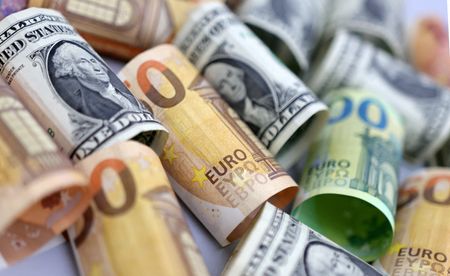By Sinéad Carew and Alun John
NEW YORK/LONDON (Reuters) -MSCI’s global equities gauge rose on Thursday, while Wall Street indexes closed lower and U.S. Treasury yields fell after a mixed bag of economic data and Federal Reserve official comments suggesting more interest rate cuts on the horizon.
On Wednesday, U.S. share prices surged after data showed easing in U.S. core inflation. While Thursday’s data included a U.S. retail sales increase in December, it was below expectations.
Also, the number of Americans filing new applications for unemployment benefits increased more than expected last week but remained at levels consistent with a healthy labor market.
U.S. Treasury yields slipped with investors reacting to Fed Governor Christopher Waller saying three or four interest cuts this year are still possible if U.S. economic data weakens further.
On Wall Street, major indexes fell a day after they registered their biggest daily percentage gains since the Nov. 6 rally following the U.S. presidential election.
“It was a roller coaster from Friday’s job print up through yesterday’s CPI,” said Adam Hetts, global head of multi-asset and portfolio manager at Janus Henderson.
“It feels like the market is taking a breather, digesting some smaller economic news, digesting some of the testimonies in D.C. and really looking forward to next week as a major catalyst.”
With President-elect Donald Trump due to be inaugurated on Monday, investors were closely monitoring U.S. Senate Finance Committee testimony from Scott Bessent, Trump’s nominee to lead the Treasury Department.
Bessent said extending Trump’s 2017 tax cuts was a top priority, that the Fed should stay independent and he was ready to impose tougher sanctions on Russia’s oil sector. This followed his prepared remarks that the U.S. must prioritize investing to grow the economy over “wasteful spending that drives inflation.”
While investors have been hoping for fewer regulations under Trump, they have been dealing with the uncertainty of whether his tariff policies would push inflation higher.
“Bessent, fortunately, is one of the less controversial appointments and so far most his comments have followed with expectations. It does reinforce the view that this is a pro-market, pro-business administration with Bessent a very important appointment,” said Hetts.
In equities, the Dow Jones Industrial Average fell 68.42 points, or 0.16%, to 43,153.13, the S&P 500 fell 12.57 points, or 0.21%, to 5,937.34 and the Nasdaq Composite fell 172.94 points, or 0.89%, to 19,338.29.
In contrast, MSCI’s gauge of stocks across the globe rose 1.31 points, or 0.15%, to 848.61.
Earlier, Europe’s STOXX 600 index closed up 0.98%, with luxury stocks boosted after Cartier jewelry brand owner Richemont’s results beat analysts’ expectations.
In currencies, the U.S. dollar fell as traders digested the mixed economic data while gauging the outlook for Fed rate cuts this year and prepared for the incoming U.S. administration.
The dollar index, which measures the greenback against a basket of major currencies, fell 0.05% to 108.98
The euro was up 0.09% at $1.0298 while against the Japanese yen, the dollar weakened 0.82% to 155.18.
Comments from Governor Kazuo Ueda had prompted traders to price in a more than 70% chance the Bank of Japan will raise interest rates next week.
In bonds, the yield on benchmark U.S. 10-year notes fell 3.8 basis points to 4.615%, from 4.653% late on Wednesday. The 30-year bond yield fell 2.2 basis points to 4.8556%.
The two-year note yield, which typically moves in step with expectations for Fed interest rate policy, fell 2.5 basis points to 4.239%, from 4.264%.
In commodities, oil prices slipped with Yemen’s Houthi militia expected to halt attacks on ships in the Red Sea, while investors digested the complex ceasefire accord between Israel and militant group Hamas.
U.S. crude settled down 1.7% at $78.68 a barrel and Brent settled at $81.29 per barrel, down 0.9%.
U.S. natural gas futures closed up about 4% at a two-year high on colder weather forecasts for the Martin Luther King, Jr. Day holiday weekend, which may cut output by freezing gas wells and pipes even as heating fuel demand rises to a record high.
Gold prices rose to the highest in more than a month on declining Treasury yields. Spot gold rose 0.65% to $2,713.26 an ounce. U.S. gold futures rose 1.38% to $2,749.80 an ounce.
(Reporting by Sinéad Carew, Gertrude Chavez-Dreyfuss, Alun John; Editing by Jane Merriman, Alexander Smith, Richard Chang and David Gregorio)








